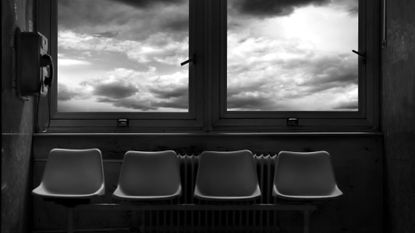

Brad is going to be so pissed if he wakes up and learns that we fucked up his Invisalign," my brother's fiancée whispered from the other side of his hospital bed. If it weren't for his labored breathing, I'd have said he looked good, like one of my girlfriends after elective cosmetic surgery. His skin was taut and dewy, his body seemingly strong. All that was left was for him to wake up.
The nightmare began a little more than a week ago when my father casually mentioned in a text message that my brother, Brad, was in the ER receiving treatment for some kind of infectious disease. "So how is everything else?" he added with predictable nonchalance. Everything else was fine but what the fuck was he talking about? I picked up my phone and called him immediately.
My family had experienced so many years of stability that we were confident in the notion that nothing *that* bad could happen.
There's this unspoken assumption when you're the child of a doctor that nothing is ever wrong with you—or at least nothing horrendous enough to warrant your father leaving work. And for the previous 38 years of my life (and 45 of Brad's), my dad was right. Sure, there had been appendicitis, tonsillitis, car accidents, premature births, broken bones, and botched Botox, but for the most part we were a healthy family with good genes and disciplined fitness regimens.
The closest we'd come to tragedy was three months earlier. My father, who'd fallen off his bike around Christmas, discovered residual damage this spring and underwent surgery. Losing him would have been life-shattering—almost as catastrophic as losing my poodle, Mr. Teets, one year earlier. But the death of a parent is still one of those inevitable events that comes with admittance to the theme park of life, something we all accept as being part of the journey.
My dad didn't die, though. He came back stronger. Within a month of his surgery, he was out of rehab, back to his workaholic ways, and challenging himself to a half triathlon per day. "Do you kind of miss Dad mildly injured?" Brad texted me a few weeks later. For our family, Dad's brush with death proved to be less a wake-up call and more a gentle reminder that sometimes accidents happen. We'd experienced so many years of stability that we were confident in the notion that nothing that bad could happen…at least nothing my dad couldn't exercise away.
My brother and I have never been that close. We have different mothers and never lived in the same house. As kids, my sister, Samantha, and I lived in San Diego and Brad in Brooklyn. The only time I saw him was in the summer when our visitations with our father overlapped.
My dad worked Monday through Friday, leaving Samantha and I trapped most days at our grandmother's townhouse watching The Price Is Right and flipping through sun-bleached photo albums, confirming that, even at 25, Grandma Florence already looked 60. The only time I'd see her smile was when she was scratching off a lotto ticket or deveining a peel-and-eat shrimp. Her house reeked of stale cigarettes, matzo ball soup, and shit-zu vomit. And though I did occasionally take pleasure in rummaging through her bedroom and dismantling all her vacation tchotchkes, I was desperate for somebody—anybody—to free me from her grasp. Enter Brad.
Stay In The Know
Marie Claire email subscribers get intel on fashion and beauty trends, hot-off-the-press celebrity news, and more. Sign up here.
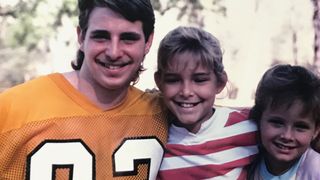
Me (center, with the epic bangs) with Brad and Samantha visiting our dad in Arizona, circa 1988
With an '80s rat tail and a thick New York accent, my brother bounced off the airplane as if a boom box blasting Beastie Boys was growing out of his shoulder. He'd gotten kicked out of private school for bringing brass knuckles to class and beating the shit out of a kid who was hitting on his girlfriend. He was hot-tempered, unruly, and up for just about anything that involved skirting the law. He'd pitch us over cement walls to break out of our father's golf community, toss us around in the swimming pool, take us to the nickel arcades, and feed us all the Hawaiian ice we could eat. Brad made summer fun. And unlike my Dad—who considered us giving him a back rub at the end of the day entertainment—Brad went out of his way to ensure we had a vacation to remember.
Almost a decade older, Brad had every opportunity to brush us aside or lock us in a closet, but he never tired of being the big brother. My fondest memory of him is from when I was 6: I woke up late at night convinced there was a monster in my room. My sister was sleeping soundly on the bed next to me; she didn't even budge when I screamed, pretending I'd seen a scorpion on her neck. I tiptoed down the hall to my father's room, leaving Samantha for dead, and knocked on the door. He answered groggily and prescribed me a glass of water, as if that would somehow ameliorate my fears. Alone and afraid, I made my way to the kitchen. Brad was in a deep sleep on a cot in the living room. In a final attempt at comfort, I aggressively shook him awake. He sat up talking to me for hours until eventually it was light out and I could confidently return to my room.
For college, Brad fled the East Coast for Arizona State. He had his Nissan 300ZX outfitted with radar detectors, reflective license covers, and personalized plates that read L8TR 4U. Strapped into his passenger seat, we'd speed down Scottsdale Boulevard screaming along to his latest favorite song—always more sentimental than expected. For as uber-masculine as my brother likes to come across, he is at his core a total softie.
Though we do share the same need for approval from strangers on Instagram, the only bond that truly ties us is our love for our father.
The desert eventually thawed the thug out of my brother, but his macho exterior remained intact. Despite all his charisma, Brad is the type of guy I'd instantly vote out of my Bachelorette mansion. Not because he wouldn't be super fun to picnic with on a pile of custom Chris Harrison pillows, but because he's a self-admitted chauvinist, the kind of Neanderthal man I could picture clubbing a woman over the head and dragging back to his cave to cook and make babies. And though we do share the same body dysmorphia, tendency to over analyze, and need for approval from strangers on Instagram, the only bond that truly ties us is our love for our father.
"We don't know what is happening," my dad managed to mumble softly when I called him to ask for more details about Brad's condition. I could hear the fear in his throat. For as long as I'd been alive, my dad had an answer for everything. Now I was talking to a different man—a man confronted with not only his own mortality, but also his child's. He was powerless. We all were.
I learned later through a less emotional source that my strapping brother—my health nut of a Spartan-racing, selfie-taking sibling—was driven to the emergency room earlier that day by my step-mom, complaining of dizziness. After several minutes, he went unconscious. A team of doctors descended, but nobody could figure out what was happening. It was clear he had an infection, but what, how, and why was uncertain. The ER was flummoxed. Eventually an echocardiogram was ordered and a tumor the size of a racquetball was discovered, flopping back and forth in Brad's left atrial valve. An atrial myxoma is a rare non-cancerous tumor that grows on the heart and, if caught, can be easily removed. In my brother's case, however, the tumor was infected with a secondary staph infection, causing it to become friable and throw off little blood clots to his extremities. Brad suffered between 11 and 15 mini strokes, and after undergoing surgery to have the tumor removed, he woke up to temporary paralysis on the left side of his body and the inability to speak, swallow, or open his right eye. He couldn't verbalize what he was feeling and instead made sounds that pierced straight through me: chilling, guttural howls that reminded me of that scene in the movie Blackfish when they separate the mother Shamu from her baby.
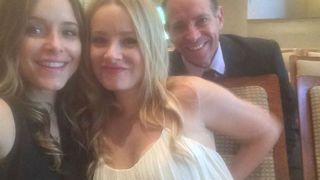
The three of us (from left: me, Samantha, and Brad) all grown up and snapping selfies at our step-brother's bar mitzvah
Before releasing Brad to rehab, the hospital put in a feeding tube. Twenty-four hours later, his white blood cell count was up to 28,000. Again, nobody knew what was happening. My father insisted the rehab clinic evaluate his abdomen to ensure the tube was in correctly. It wasn't; it was leaking fluid into the rest of his body. Brad was rushed to a second hospital where an emergency laparoscopy was performed to clean out his insides and replace the tube.
My plane touched down in Phoenix just as they were closing my brother's stomach back up. When I walked into the hospital, I found my dad pacing in the waiting room, trying to make sense of the series of events. "Why hadn't there been more signs?" "Should Brad have had an MRI earlier?" "What kind of hospital puts a feeding tube in wrong?" None of our questions had answers, making it that much harder to stop asking them.
Eventually, Brad was moved from the OR to the ICU and I was able to see him. He wasn't sedated but he was still non-responsive. I touched his hand, told him I was there, and gave him shit about shaving his arms—a fact I hadn't realized until that moment. I know he could hear me. I know if he could speak he would have been inquiring about how his new scars would make him look in a bathing suit. Reading his mind, I assured him that the incisions were thin and that I would get him to the best laser guy as soon as he was ready.
If he didn't recover completely, maybe it would actually improve our relationship: I could pretend he agreed with all my feminist views.
Hypnotized by the beeping of his heart monitor, I started thinking about the future and what it held; if he'd recover or if he wouldn't. I made peace with the circumstances by convincing myself that if he got better, maybe this would give him a new life purpose and direction. Maybe he'd become a motivational speaker, a physical therapist, or an advocate for stroke victims worldwide. If he didn't recover completely, maybe it would actually improve our relationship: I could invite him on vacation, throw a sombrero on his head, a beer in his good hand, and pretend he agreed with all my feminist views.
They say if you've seen one stroke, you've seen one stroke. There is no definitive prognosis. Everybody recovers differently. Some people wake up, some never do. The parade of specialists, hospitalists, residents, and nurses treating him seem like Vegas palm readers, spouting theories and hunches that only lead to confusion and further despair.
For my dad—the doctor with all the answers, the father of three healthy children—this not knowing has been unbearable. This isn't something he can diagnose, understand, or simply exercise away. Every day is a fight to maintain Brad's dignity and care. But as far as answers go, we have none.
A very bad thing happened to my brother and all I can do is wait, hope for a miracle, and pray the moment comes when he sits up and thanks me for totally maintaining his Invisalign.
Jenny Mollen is an actress and New York Times-bestselling author. Her most recent book, Live Fast, Die Hot is available in paperback wherever books are sold. Follow her on Instagram.
-
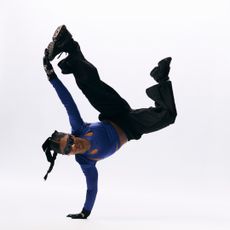 A Sporty It-Sneaker Era Is About to Begin
A Sporty It-Sneaker Era Is About to BeginNike's next Air models are designed for Olympic athletes, but they'll soon be all over street style.
By Halie LeSavage Published
-
 These Luxury Beauty Gifts Are Proven to Make Mom Feel Spoiled on Mother’s Day
These Luxury Beauty Gifts Are Proven to Make Mom Feel Spoiled on Mother’s DayThe best in makeup, haircare, and skincare for your favorite woman.
By Brooke Knappenberger Published
-
 Women on ‘The Hills’ Were Put In ‘Compromised Situations’ Like ‘Blood Sport,’ Cast Member Lo Bosworth Says
Women on ‘The Hills’ Were Put In ‘Compromised Situations’ Like ‘Blood Sport,’ Cast Member Lo Bosworth SaysAs compared to its predecessor, ‘Laguna Beach,’ Bosworth said ‘The Hills’ had a “much bigger impact from a drama and trauma perspective.”
By Rachel Burchfield Published
-
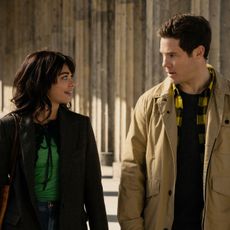 Sarah Hyland and Adam Devine Play 'How Well Do You Know Your Co-Star?'
Sarah Hyland and Adam Devine Play 'How Well Do You Know Your Co-Star?'The 'Modern Family' stars reunited for the 'Pitch Perfect' spinoff series.
By Brooke Knappenberger Published
-
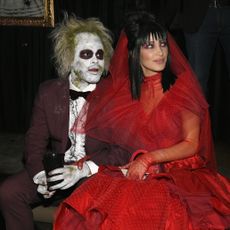 The 78 Best Celebrity Couple Halloween Costumes of All Time
The 78 Best Celebrity Couple Halloween Costumes of All TimeHonestly, we're impressed.
By Charlotte Chilton Published
-
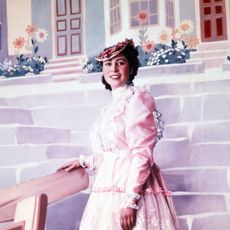 Super Rare Photos of Queen Elizabeth as a Young Woman
Super Rare Photos of Queen Elizabeth as a Young WomanFrom childhood snapshots to portraits as a young princess, beautiful and rare photos of the late Queen Elizabeth as a young woman.
By Mehera Bonner Published
-
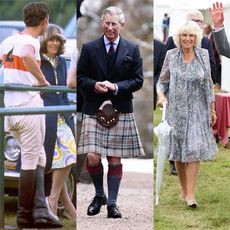 King Charles III and Queen Consort Camilla's Relationship: A Timeline
King Charles III and Queen Consort Camilla's Relationship: A TimelineWith the passing of Queen Elizabeth II, Charles has ascended to the throne as king.
By The Editors Published
-
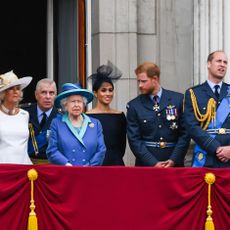 Who Is Next in Line for the British Throne, Explained
Who Is Next in Line for the British Throne, ExplainedAnd yes—Harry and Archie are still in the line of succession.
By Andrea Park Published
-
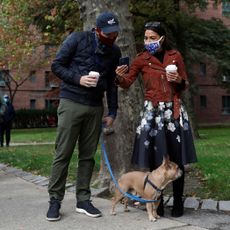 Who Is Alexandria Ocasio-Cortez's Fiancé Riley Roberts?
Who Is Alexandria Ocasio-Cortez's Fiancé Riley Roberts?AOC's husband-to-be is an "easygoing redhead" who lives with her in D.C.
By Katherine J. Igoe Published
-
 68 Times the Kardashians Posed Fully Nude and Owned It
68 Times the Kardashians Posed Fully Nude and Owned ItAnd we mean fully nude—as in, not a shred of clothing.
By Bianca Rodriguez Published
-
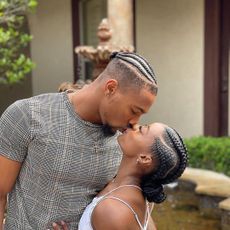 Who Is Jonathan Owens, Simone Biles's Fiancé and NFL Player?
Who Is Jonathan Owens, Simone Biles's Fiancé and NFL Player?"The easiest yes!" Simone wrote about the couple's engagement.
By The Editors Published